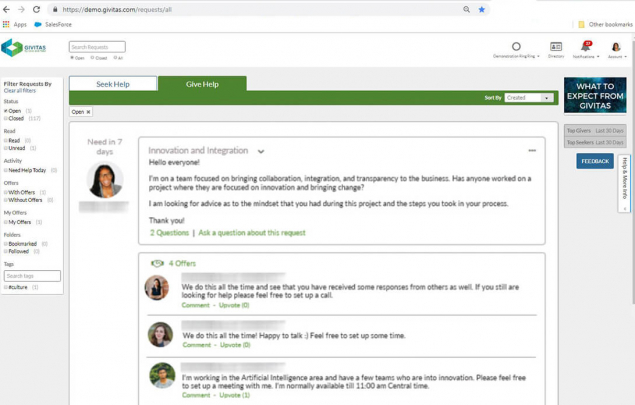
The spirit of generosity and supporting our neighbors are the heart of a community. It is also the heart of Givitas, a purpose-built platform for people to request help when they’re not sure where to turn.

Led by serial entrepreneur Larry Freed, Give and Take Inc’s core products are Givitas™, the Reciprocity Ring®, and the Virtual Reciprocity Ring™. The Reciprocity Ring was originally developed about 20 years ago by Wayne Baker, a University of Michigan professor and author of All You Have to Do Is Ask, and Cheryl Baker, a social scientist.
Adam Grant, a Wharton professor and author of Give and Take was a PhD student at the University of Michigan at the time and the first facilitator of the Reciprocity Ring. The Reciprocity Ring is a dynamic group exercise that teaches the power of asking for help and the value of being a giver and helping others. It also illustrates that the activity of asking for, and giving help, is a great way to create high-quality connections.
Wayne, Adam, and Cheryl formed Give and Take in 2016 with the goal to create Givitas, the online manifestation of the Reciprocity Ring, to allow people to put the practices learned in the Reciprocity Ring to use every day, and across their organization. Givitas and the Reciprocity Ring have shown that engagement, loyalty, and profitability are all outcomes of creating a generous culture.
“The process to find someone who can help with a specific problem you’re having can be long and daunting,” Freed said. “There’s also a stigma around asking for help, it is often mistakenly seen as a sign of weakness. Driven by Adam and Wayne’s research and evidence-based practice, everything we do in Givitas is focused on making it easy and efficient to ask for and to give help, while creating a collaborative community fueled by generosity. We refer to it as creating a cycle of generosity. With Givitas, there are no anonymous asks. When you join a community, you see all requests for help and all offers of help, which encourages you to make your own requests for help and to offer help to others. For those who are still reluctant to jump in and make a request, they can learn from other’s questions and answers. It also provides equal access, for all the participants, to the communities’ knowledge and experience.” Other concepts, such as a leaderboard in each community that shows who has helped others and encouraging users to show gratitude for the help they have received, further support participation in the Givitas communities.
“Givitas makes it psychologically safe and easy to ask for help, especially when you don’t know who to ask. And it makes it efficient to be a giver, to help someone, in less than five minutes a day.”
Compared to other social media platforms, where the metric of success is spending more time on a platform, Givitas is designed to provide a return in minimal time. “It doesn’t matter why you gave — it matters you did,” he said. “And what you see is that incredible things come from paying it forward, the least of which is building social capital and growing your network.”
Not only are consumers attracted to Givitas, so are investors. When he joined the company in 2017, Freed raised its first seed round, led by RPM Ventures along with participation from Invest Michigan, Grand Ventures, and a select group of angels. Freed is also an investor in the company. In 2019, the company offered a seed extension round, and the Michigan Angel Fund, administered by Ann Arbor SPARK, participated in that funding round, along with Woodward Angels, University of Michigan’s MINTS, and the current investors.
Currently, Give and Take’s products are being used by Fortune 100 companies, associations, non-profits, governments, community groups, authors/thought leaders, and many of the leading universities in the world. At a university in Europe, it led to a lifesaving ask being answered.
“In advance of an event the university was hosting,” Freed explained. “Someone made a request about their niece in Romania having a rare brain abnormality that couldn’t be helped by locally available resources and the family did not have the resources to pursue options elsewhere. One thing led to another and someone knew someone who could help and get them to the right doctor, and get it funded. The surgery was a success and it is a great example of the incredible power in asking.”
To date, more than 100,000 people have experienced the benefits of participating in the Reciprocity Ring and Givitas. With the platform’s recently launched communities for nonprofit leaders, association leaders, and Michigan-based startups, that reach is sure to be extended.
“It’s great to believe in what you’re doing,” Freed said of the company’s success. “It’s really remarkable to be able to do good and do well in life, too.”
Describing what he calls unsolicited love letters to Givitas, Freed said, “People reach out to us and say, ‘I have always wanted to help others but didn’t know how because no one wants unsolicited help,’ or ‘I thought it would be harder to give help verses asking for help, and the opposite it proving to be true.’”
“Through Givitas, I’m reminded every day that it’s a sign of strength to ask for help, that whatever company, initiative, or objective I’m focused on advancing is more important than my ego,” he added.
As for what’s next, Freed explained the company is looking to execute another round of funding in late 2020. “I am excited about where we are and what we’re doing through Givitas,” he said. “We’re finding the right points of traction within the business and are going to hit the gas where we can, with the goal of engaging more people in our growing community rooted in generosity.” To experience Givitas, join a free community by checking the resources tab on GiveAndTake.com or visiting givitas.com/free.